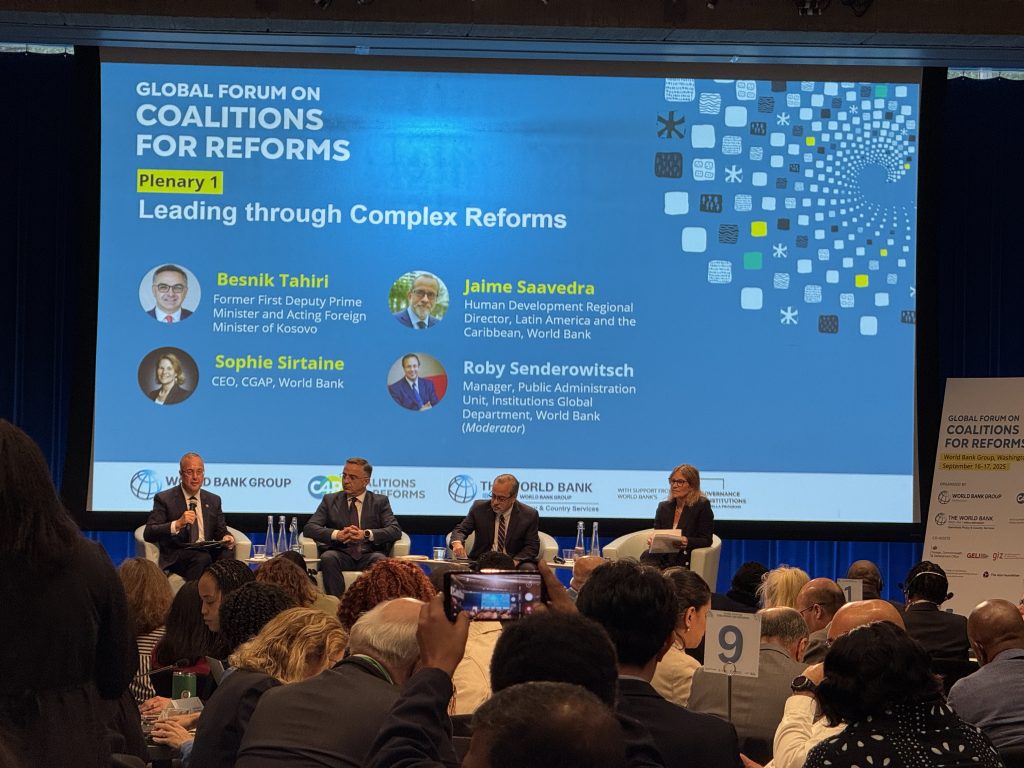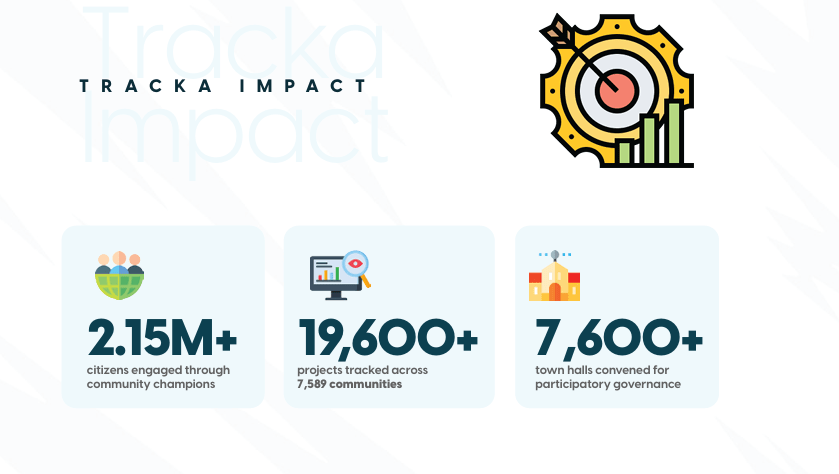The Global Forum on Coalition for Reforms was held at the World Bank Headquarters in Washington, D.C., on September 24 and 25, 2025. The event brought together a diverse group of stakeholders, including Professor James A. Robinson, a Nobel Prize winner and Professor at the Harris School of Public Policy at the University of Chicago; Besnik Tahiri, the former Deputy Prime Minister of Kosovo; and James Saavedra, the former Minister of Education of Peru. Their discussions moved beyond theory to provide a practical playbook on the political economy of reform, sparking discussions on solutions for driving progress using productive politics, building trust, and gaining the support necessary for success. This article explores the key themes and lessons from the forum for broader knowledge sharing and practical methods to enhance reform efforts and achieve lasting change.
“Politics is not a friction; it is the solution to many problems.”
– Professor James A. Robinson
This statement raises the question: What if politics isn’t the problem but the solution? Many in the development sector frequently view politics as the main barrier to progress. This forum, however, reframed the conversation by exploring the political economy of reforms not as a barrier but as the mechanism for achieving lasting change. Here are five lessons to ponder.

Lesson 1: Embrace Politics as a Productive Force, Not an Obstacle
The most fundamental insight from the forum was the need to view politics as a productive force. As Professor James Robinson stated, politics is productive, so, rather than attempting to create “technocratic” reforms protected from politics, successful change requires skillfully using political tools to foster cooperation. To achieve this, Professor James identified three key components:
- Create collective identities
- Devise shared rituals that reinforce a shared identity
- Innovate ceremonies and sacred places to bring people together
Professor James ended his speech by stating that long-lasting reforms are not implemented despite politics but are built on a foundation of thoughtful and constructive political engagement.
Lesson 2: Trust is the Foundational Currency of Leadership
A recurring theme across plenary sessions was the prerequisite of trust. A government or institution cannot build a coalition for reform without first earning the trust of its citizens and stakeholders.
“It is vital to include all who would be affected by reforms because it creates a shared purpose, making it more possible for reforms to succeed”.
– Sophie Sirtaine, CEO, CGAP, World Bank
Building strong trust requires a demonstrated combination of Confidence, Competence, Compromise, and Bravery. Another important note of the session was that leaders must avoid the common blind spot of focusing on a single constituency, instead of working to build broad-based support. Trust enables leaders to act as brokers for the relationships necessary to unite diverse interests, making it the most valuable asset in any reform effort.
Lesson 3: Co-Creation with Stakeholders is Essential for Sustainability
A small group of experts often designs reforms and then “sells” them to the public. The forum strongly emphasized a more inclusive and effective approach, which is co-creation. In the session, “The Art and Science of Changemaking.” Rakesh Rajani, President of JustSystems, stated that,
“Every action counts toward advancing reform; however, these steps must be intentional and relevant for the change and impact you want to see.”
He emphasized three factors in this note: the clarity of the vision and reform, the emphasis on engaging and managing people, and the development of communication channels to connect strategy with storytelling.
Having clear outcomes strengthens coalitions by giving vision, structure, and direction. This is where co-creation comes in as a collaborative model that fosters a powerful sense of national and local ownership, which makes reforms more resilient and durable. When citizens and communities come together to shape a solution, they become its greatest champions and advocates, ensuring that change remains long after its beginning.
Lesson 4: Data Provides Proof, and Storytelling Drives Momentum
In an era of competing priorities, data is indispensable because it helps to facilitate decisions. Data shows stakeholders where their interests and investments have gone and the impact of the reform. However, data on its own is often not enough to inspire action, and this is where storytelling is essential. Illana Ron Levey, Managing Director of Gallup, mentioned that the most successful reformers pair robust evidence with strategic storytelling and that even when the goal of a reform has not been met, showing the journey of its progress creates a compelling narrative that captures the public’s imagination and builds an aspirational vision for the future. These insights highlight that a combination of proof and purpose is essential for mobilizing the support needed to see a reform through to completion.
Lesson 5: Technology and AI as Catalysts for Reform
Having established that politics and trust drive reform, we can agree that technology is the accelerator that sustains it. Currently, the world is in a digital age where technology, open data systems, and artificial intelligence (AI) have become embedded in societal reform. These tools help to reshape how reforms are designed, tracked, implemented, and used to strengthen the relationships, systems, and accountability mechanisms that make them possible. Code for Africa’s civic tech network, India’s Digital Public Infrastructure, and Estonia’s e-Governance model are vital examples of how AI-powered dashboards and data visualization tools are helping to transform governance by making public spending, social programs, and performance metrics visible and verifiable.

For over a decade, BudgIT has continued to contribute to the advancement of technology and AI for social reform in West Africa through our digital platforms. Our Tracka is a citizen-led project tracking tool that empowers communities to monitor government projects in real time and ensure that public resources lead to actual service delivery. BudgIT’s Bimi, an AI-powered governance assistant, makes it easier for citizens to access information about government finances, project updates, and service delivery. Overall, these platforms show how technology can make civic engagement personal, adaptive, responsive, and participatory.
The Global Forum on Coalitions for Reforms shed light on the difficulties of reforms and emphasized the message that successful reform is a complex art that demands a profound understanding of the political landscape, a commitment to building trust, and the ability to unite diverse groups around a shared vision for a better future. The ultimate lesson is that we need to have the motivation and bravery to advance reforms because actions speak and encourage people, organizations, and governments to trust and support our reform.
Abiola Afolabi, International Growth Lead, BudgIT, and Rebecca Nzerem, Communications Officer, BudgIT, write from Chicago, IL.
